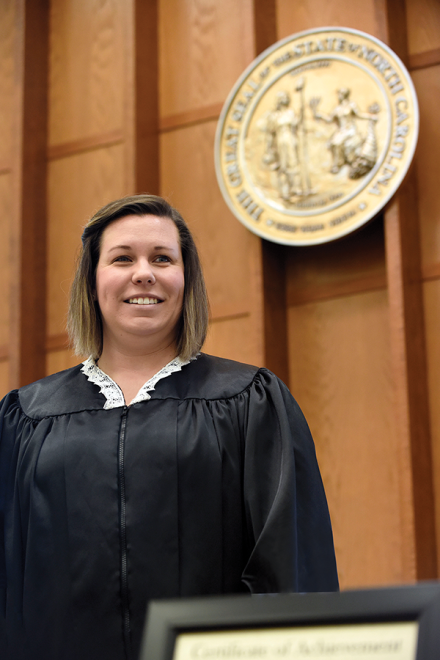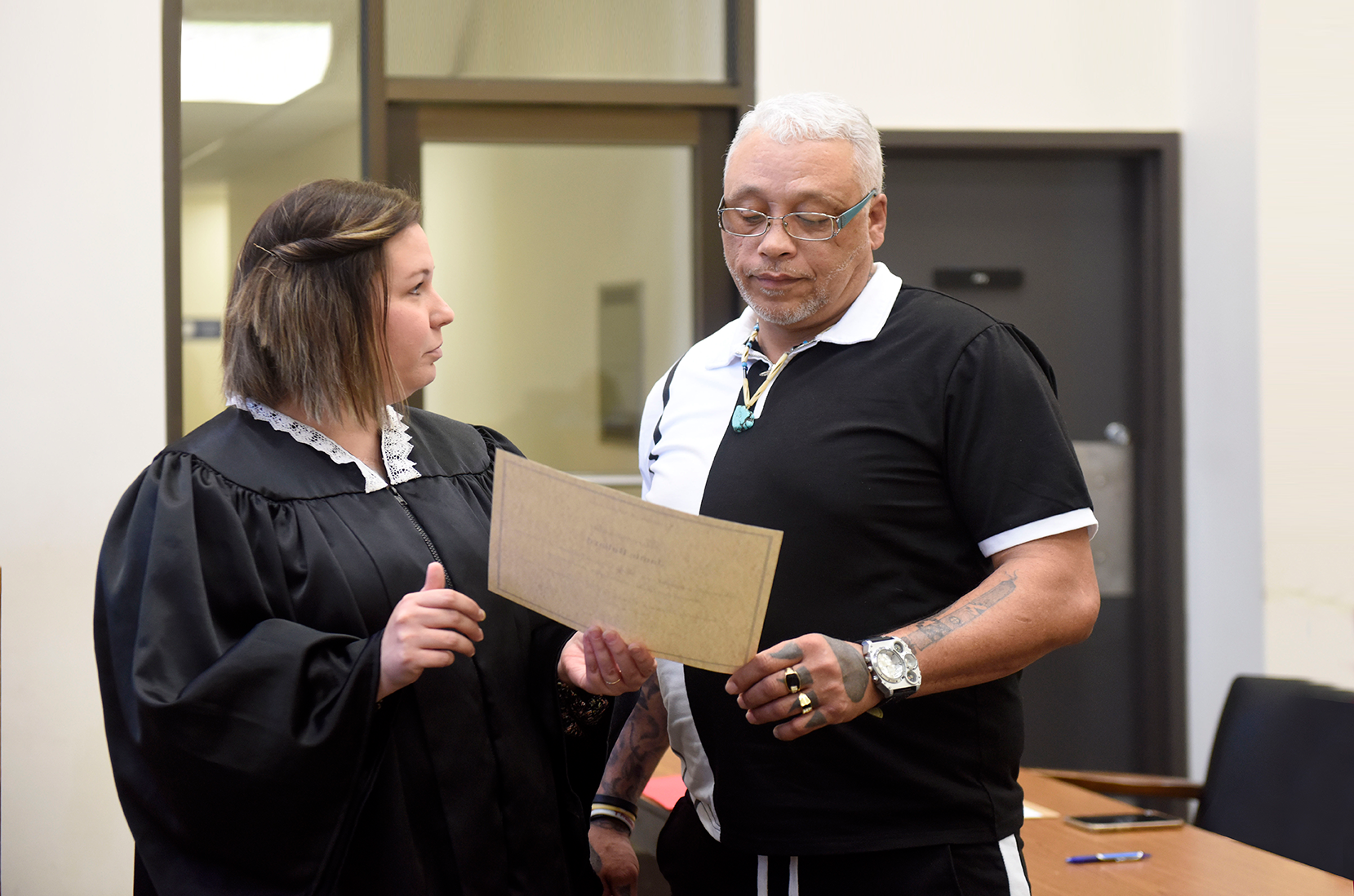Seven years after graduating from Elon University School of Law, the Hon. Leah Britt Lanier embraces her role helping others in their journeys toward sobriety.
The chambers of the youngest district court judge currently serving in North Carolina can be found in Robeson County, on the third floor of a concrete and glass complex in the heart of Lumberton, the last town on i-95 before you cross the state’s border into South Carolina.
They’re right off a back hallway from Courtroom 3a. On the wall are diplomas from Elon University School of Law and her undergraduate alma mater, Campbell University, separated by a framed license to practice law. On her desk is a small brass placard with a simple message: “The Future is Female.”
At 31, the Hon. Leah Britt Lanier L’17 serves a unique role in the judicial system of North Carolina’s largest county by acreage. The former prosecutor oversees the Recovery Court of Robeson County, technically a collection of three courts — DWI Treatment Court, Adult Drug Treatment Court and Family Drug Treatment Court — that help those grappling with substance abuse.
On a brisk, sunny winter day, the men and women who entered Courtroom 3a had already pleaded guilty to driving under the influence. In lieu of jail, participants agree to work with a team under Lanier’s direction who support their
recovery efforts.
Three dozen participants took turns approaching the bench not for judgment or punishment but to answer her most important question: “What can I do to help you?”

* * *
Lumberton has always been home. Lanier’s grandparents were farmers, her dad the owner of a successful car dealership. Mom taught in the Robeson County public schools before her death from cancer in 2021. An older brother was also a teacher for several years before joining their father in auto sales.
Lanier studied political science at Campbell where she identified a passion for advocacy and, in her description, “standing up for victims and for people who didn’t always have a voice.” Law school was an obvious next step. Following graduation in 2017, she returned to Robeson County as a prosecutor.
The county is as diverse as it is dispersed. Lumberton and Pembroke are the two largest towns. More than a third of county residents are indigenous, notably of the Lumbee Tribe, with white and Black populations each comprising about a quarter of the community. A flat economy and an interstate that bisects the county have fueled the rise of substance abuse throughout the region.
Lanier had been with the district attorney’s office for a few years when she plunged into politics. Her age raised a few eyebrows, but as voters learned that she was rooted in the community, support started to build. She won her seat in 2022 with 57% of the vote. The district court’s chief judge soon approached: Would Lanier have interest in taking over the Recovery Court?
“I was willing to give it a try,” Lanier says. “And then I got attached to all the people. Participants tell me what’s going on in life. Asking what they need and how we can help goes a long way.”
* * *
Research shows that some adult drug treatment courts can reduce recidivism by up to 50%. Communities also spend less money on treatment than on prison for those who qualify.
Participants are nonviolent offenders. They’ve been arrested more than once for driving under the influence or misdemeanor drug possession. In line with the court’s family-centered approach, a few are working toward reunification with children placed in protective services. Lanier ensures they’re attending treatment, seeking or maintaining employment, and taking advantage of community resources if there’s a question of housing or food insecurity. She praises every success shared in court.
Lanier’s colleagues marvel at her passion and compassion. “She’s involved in everything,” says Val Comrie, a coordinator for the county’s Family Drug Treatment Court. “That has really made a difference. The first thing she told me was, ‘I need to know everything about these programs. I really want them to work. I want to make a difference in the lives of each and every person that I see.’”
If I don’t take the time to make a difference, what community is my child growing up in? I need to use every avenue I have for the better.
Sometimes participants bring their babies with them to court. If they’re seeking help through inpatient treatment programs, they appear via Zoom. For newcomers, notably those battling substance abuse or alcoholism for decades, it’s a surprise to meet a judge who is young enough to easily be their daughter.
“Half the time she doesn’t even wear her robe,” says Paula Fairfax, the coordinator for the DWI Treatment Court in Robeson County. “She wants it to be different from other courts, with more compassion and caring. Many of my participants already feel a lot of guilt and remorse and shame because of what they’ve done. Every one of them say they feel comfortable around her.”
* * *
On this day, by the time Lanier adjourns court, two men have been “terminated” from probation after “graduating” from the DWI court program. They’d fulfilled the requirements of finding help in their journeys toward recovery. A small lunch celebration is about to start in a downstairs conference room when Lanier makes a quick stop to her office.
“There’s a stigma about the court system and there’s a stigma about recovery,” Lanier says. “People in our programs benefit from a whole team. They’re not being judged for their criminal past. They’re being judged for the person they are now.”
Historically, Robeson County has leaned Democratic, and Lanier is the first Republican in recent memory to win a countywide judicial election. Now, a year after welcoming her first daughter with husband John Lanier l’18, another Elon Law graduate who serves Robeson County as an assistant district attorney, the judge is brainstorming ways to expand programs.
One idea is starting a nonprofit where donations go toward additional resources not funded by the state. Whether that happens remains to be seen. The work, however, is deeply personal, and deeply rewarding.
“I’m raising my child here,” Lanier says on her way to the lunch festivities. “If I don’t take the time to make a difference, what community is my child growing up in? I need to use every avenue I have for the better.”



